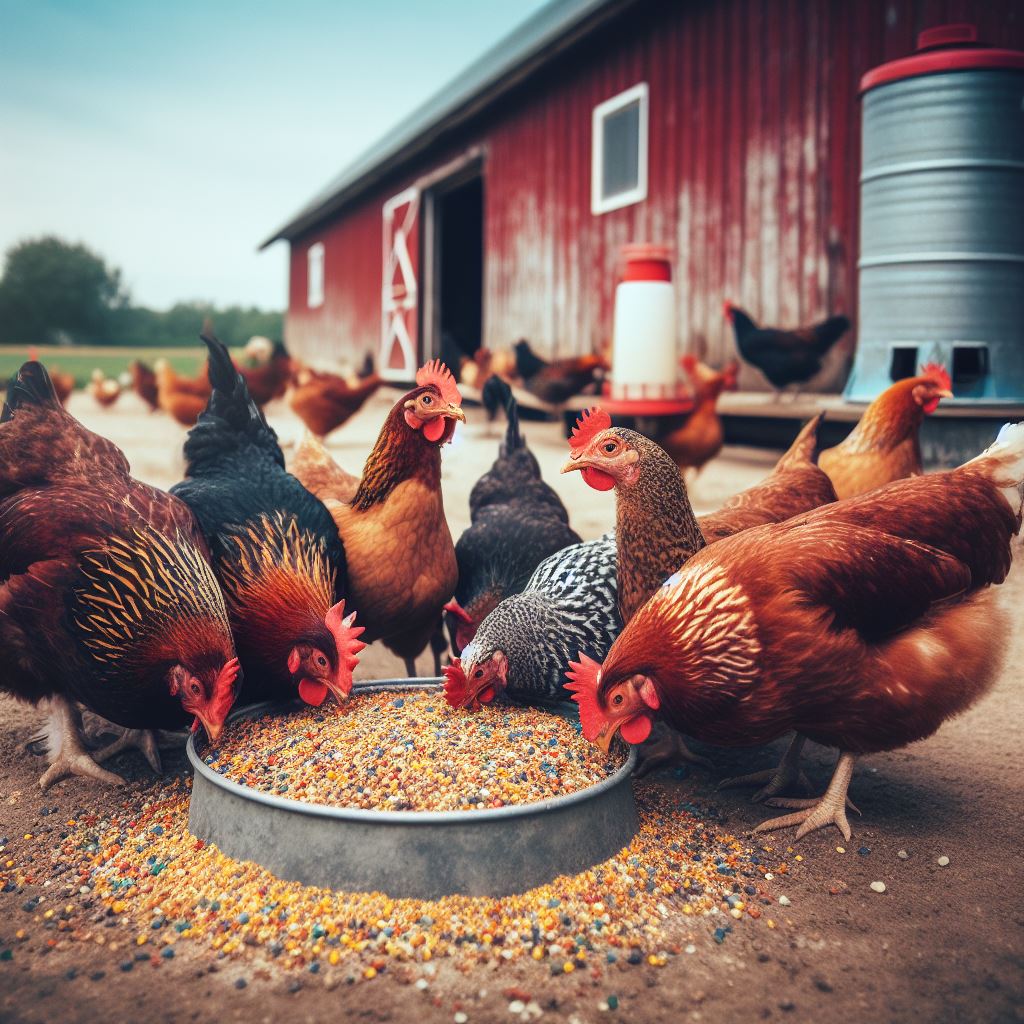Can Chickens Eat Sauerkraut? Exploring Poultry Nutrition

Table of content:
- Is Sauerkraut Safe for Chickens?
- What Are the Benefits of Feeding Chickens Sauerkraut?
- Will Sauerkraut Upset a Chicken’s Stomach?
- Do Chickens Like the Taste of Sauerkraut?
- How Much Sauerkraut Should You Feed Chickens?
- Should You Feed Chickens Sauerkraut Every Day?
- Is Fermented Sauerkraut Okay for Chickens?
- Can Sauerkraut Cause Digestive Issues in Chickens?
- Is Homemade or Store-Bought Sauerkraut Better for Chickens?
- Final Thoughts
Sauerkraut, a fermented cabbage dish, is a favorite condiment for hot dogs and sandwiches. But can chickens eat sauerkraut too? Let’s take a closer look at whether this tangy fermented food is safe and healthy for chickens.
Is Sauerkraut Safe for Chickens?
Sauerkraut is generally safe for chickens to eat. The fermentation process preserves the cabbage and creates probiotics that support gut health. Here are some key factors to consider:
- pH Levels – Sauerkraut has an acidic pH which helps eliminate harmful bacteria like salmonella. The acidic environment is gentle on chickens’ digestive systems.
- Fermentation – The lactic acid fermentation also produces beneficial probiotics. These live cultures help populate chickens’ guts with healthy bacteria to aid digestion.
- Raw Versus Cooked – Raw, unpasteurized sauerkraut contains more active probiotics. Cooked sauerkraut has fewer beneficial bacteria but is still nutritious. Both are safe for chickens.
- Freshness – Ensure the sauerkraut has not become moldy or rotten. Discard any sauerkraut that smells bad or looks spoiled.
As long as you offer fresh, high-quality sauerkraut in moderation, it can be a safe treat. Introduce it slowly at first to check for any digestive issues.
What Are the Benefits of Feeding Chickens Sauerkraut?
Sauerkraut offers a few health benefits when included as part of a balanced diet:
- Probiotics – The live cultures help establish healthy gut flora in chickens. More good bacteria improve digestion and strengthen immunity.
- Vitamin C – Sauerkraut contains high levels of immune-boosting vitamin C. This helps chickens stay healthy.
- Fiber – The cabbage in sauerkraut provides insoluble fiber. Fiber promotes good digestion and waste elimination.
- Antioxidants – Sauerkraut contains antioxidants which can help neutralize free radicals and reduce inflammation.
- Nutrients – Sauerkraut offers small amounts of minerals like iron, calcium, magnesium, and potassium. It also provides some B vitamins.
While not a complete feed itself, sauerkraut can provide supplemental nutrition and support overall wellness in backyard flocks.
Will Sauerkraut Upset a Chicken’s Stomach?
Sauerkraut is easy for most chickens to digest. The fermented cabbage is pre-broken down, making it gentler on the gut. The natural probiotics also ease digestion.
However, sauerkraut could potentially cause diarrhea, gas, or bloating if chickens eat too much. Introduce sauerkraut slowly and watch for the following signs of digestive upset:
- Runny droppings
- Loose stool
- Increased passing of gas
- Distended crop or abdomen
- Decreased appetite
- Lethargy
To prevent issues, feed sauerkraut in moderation – no more than 1-2 tablespoons per chicken, 1-2 times per week. Provide free-choice insoluble grit to aid digestion too.
Do Chickens Like the Taste of Sauerkraut?
Chickens may need some time to acquire the taste for sauerkraut. The salty, sour flavor is different from their regular feed. Here are some tips for getting picky chickens to try it:
- Mix a small amount of sauerkraut into their feed to introduce the flavor.
- Offer sauerkraut as a snack independently from main meals.
- Combine sauerkraut with treats they already enjoy such as mealworms, fruit, oats, or rice.
- Allow the sauerkraut to come to room temperature – chickens may reject chilled sauerkraut straight from the fridge.
Be patient, as chickens often need multiple exposures to accept new foods. Observe your flock – chickens that enjoy the taste will come running for sauerkraut snacks.
How Much Sauerkraut Should You Feed Chickens?
When offering sauerkraut as a supplemental treat, moderation is key. Too much can lead to loose stool, diarrhea, or weight gain. Follow these portion guidelines:
- Adult chickens – 1-2 tablespoons, 1-2 times per week
- Chicks – 1 teaspoon, 1-2 times per week
- Roosters – 2-3 tablespoons, 1-2 times per week
A handful of sauerkraut 2-3 times a week per flock is sufficient. Spread servings out over different days rather than offering it all at once.
Also, provide plenty of fresh water to help dilute the salty brine. Avoid feeding sauerkraut daily long-term, as overconsumption could lead to excess sodium intake.
Should You Feed Chickens Sauerkraut Every Day?
It’s best not to feed chickens sauerkraut every day. Used sparingly 1-2 times a week, sauerkraut can provide a nutritious probiotic boost. But overfeeding it can cause health problems.
Too much sauerkraut could lead to:
- Excess sodium intake, increasing thirst and urination
- Diarrhea or digestive upset from too many probiotics
- Nutritional imbalances from filling up on sauerkraut rather than complete feed
- Obesity if chickens eat too many excess calories
Additionally, chickens may tire of the flavor if offered sauerkraut too often. Keep it an occasional treat to maximize its benefits. Focus their main diet on a complete layer feed and provide a varied “salad bar” of treats like fruits, veggies, bugs, and grains.
Is Fermented Sauerkraut Okay for Chickens?
The live active cultures created through lactic acid fermentation are what make sauerkraut beneficial for chickens. Raw, unpasteurized sauerkraut contains the most probiotics. Here’s how to source good fermented sauerkraut:
- Buy refrigerated sauerkraut – Refrigeration helps maintain live probiotic cultures. Look for raw, unpasteurized brands.
- Check the label – Opt for sauerkraut made using traditional fermentation techniques, not shortcuts like vinegar pickling.
- Avoid canned sauerkraut – The high heat of canning destroys most probiotics. Refrigerated is better.
- Make your own sauerkraut – DIY fermentation allows you to control the ingredients. Use simple recipes with just cabbage, salt, and spices.
- Try fermented feed – Some chicken keepers make “fermented salsa” by fermenting vegetable scraps to feed their flock.
As long as the sauerkraut contains live active cultures, the probiotic benefits remain intact for your chickens.
Can Sauerkraut Cause Digestive Issues in Chickens?
Sauerkraut is generally gentle on chickens’ digestion thanks to the live probiotics it contains. But eating too much sauerkraut could lead to the following digestive problems:
Diarrhea – An excess of probiotics may loosen stool. Diarrhea also releases excess sodium from the sauerkraut’s brine.
Constipation – Too much dry cabbage could cause constipation in some chickens. Make sure to provide insoluble grit.
Gas and bloating – The cabbage in sauerkraut may cause more gas. Make sure chickens also have access to probiotic-rich yogurt or kefir to aid digestion.
Reduced appetite – Chickens may fill up on sauerkraut and eat less of their normal feed, leading to nutritional deficits.
Weight gain – Sauerkraut contains more calories than plain cabbage. Too much could contribute to obesity.
To avoid issues, introduce sauerkraut slowly, feed it in moderation, and discontinue use if any digestion problems arise. Consulting a vet is recommended if significant diarrhea or constipation occurs.
Is Homemade or Store-Bought Sauerkraut Better for Chickens?
Both homemade and commercial sauerkraut offer benefits:
- Homemade – Allows you to control ingredients. Can customize recipes for chickens. Provides active probiotics.
- Store-bought – Convenient option. Look for raw, unpasteurized versions with live cultures. Offers more consistent nutrition.
When buying pre-made sauerkraut, check labels for phrases like “unpasteurized” and “contains live cultures.” Avoid heavily processed products with long ingredient lists.
For homemade, use simple fermentation recipes. Chopped cabbage with salt is all that’s needed. Add chicken-safe spices like garlic or dill. Maintain proper sanitation when fermenting.
Either way, offer sauerkraut in moderation. Prioritize their overall balanced diet using quality commercial feed and variety of treats.
Final Thoughts
Sauerkraut can be a nutritious supplement for backyard chickens when fed responsibly. The fermented cabbage provides probiotics, vitamins, minerals, fiber, and antioxidants. Chickens tend to enjoy the zesty flavor.
Introduce sauerkraut slowly and feed it in moderation, about 1-2 times per week. Monitor chickens for any signs of digestive upset. As long as chickens tolerate it well, sauerkraut can give their health a beneficial boost!
Welcome. I’m Adreena Shanum, the proud owner of this website, and I am incredibly passionate about animals, especially poultry. I founded adreenapets.com as a labor of love, stemming from my desire to share my knowledge and experiences with poultry enthusiasts worldwide.




